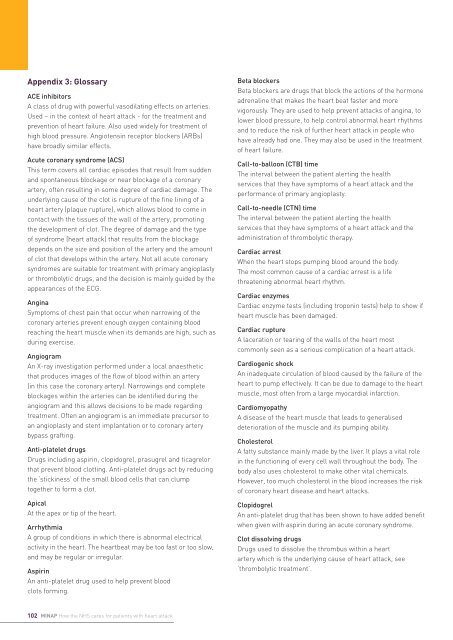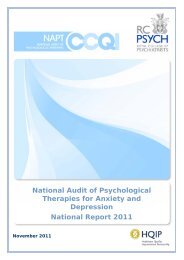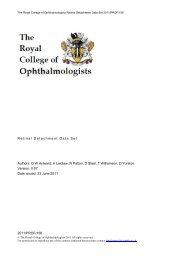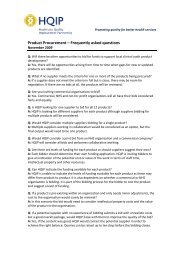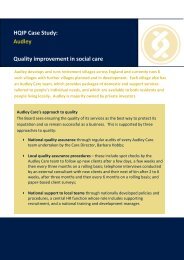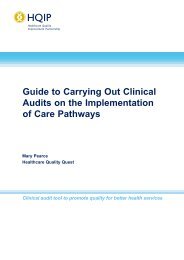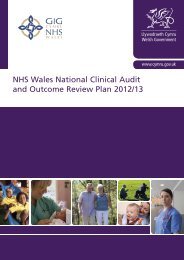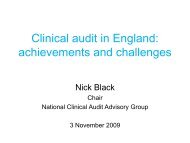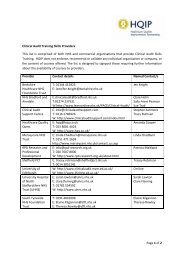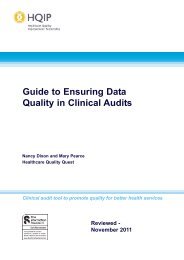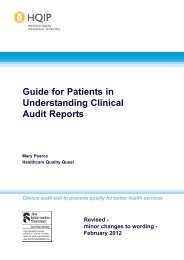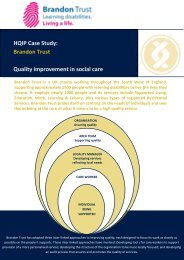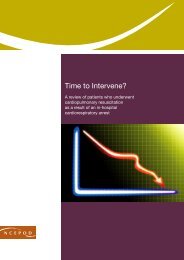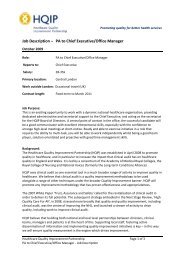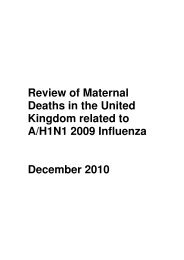Myocardial Ischaemia National Audit Project - University College ...
Myocardial Ischaemia National Audit Project - University College ...
Myocardial Ischaemia National Audit Project - University College ...
Create successful ePaper yourself
Turn your PDF publications into a flip-book with our unique Google optimized e-Paper software.
Appendix 3: GlossaryACE inhibitorsA class of drug with powerful vasodilating effects on arteries.Used – in the context of heart attack - for the treatment andprevention of heart failure. Also used widely for treatment ofhigh blood pressure. Angiotensin receptor blockers (ARBs)have broadly similar effects.Acute coronary syndrome (ACS)This term covers all cardiac episodes that result from suddenand spontaneous blockage or near blockage of a coronaryartery, often resulting in some degree of cardiac damage. Theunderlying cause of the clot is rupture of the fine lining of aheart artery (plaque rupture), which allows blood to come incontact with the tissues of the wall of the artery, promotingthe development of clot. The degree of damage and the typeof syndrome (heart attack) that results from the blockagedepends on the size and position of the artery and the amountof clot that develops within the artery. Not all acute coronarysyndromes are suitable for treatment with primary angioplastyor thrombolytic drugs, and the decision is mainly guided by theappearances of the ECG.AnginaSymptoms of chest pain that occur when narrowing of thecoronary arteries prevent enough oxygen containing bloodreaching the heart muscle when its demands are high, such asduring exercise.AngiogramAn X-ray investigation performed under a local anaestheticthat produces images of the flow of blood within an artery(in this case the coronary artery). Narrowings and completeblockages within the arteries can be identified during theangiogram and this allows decisions to be made regardingtreatment. Often an angiogram is an immediate precursor toan angioplasty and stent implantation or to coronary arterybypass grafting.Anti-platelet drugsDrugs including aspirin, clopidogrel, prasugrel and ticagrelorthat prevent blood clotting. Anti-platelet drugs act by reducingthe ‘stickiness’ of the small blood cells that can clumptogether to form a clot.ApicalAt the apex or tip of the heart.ArrhythmiaA group of conditions in which there is abnormal electricalactivity in the heart. The heartbeat may be too fast or too slow,and may be regular or irregular.AspirinAn anti-platelet drug used to help prevent bloodclots forming.Beta blockersBeta blockers are drugs that block the actions of the hormoneadrenaline that makes the heart beat faster and morevigorously. They are used to help prevent attacks of angina, tolower blood pressure, to help control abnormal heart rhythmsand to reduce the risk of further heart attack in people whohave already had one. They may also be used in the treatmentof heart failure.Call-to-balloon (CTB) timeThe interval between the patient alerting the healthservices that they have symptoms of a heart attack and theperformance of primary angioplasty.Call-to-needle (CTN) timeThe interval between the patient alerting the healthservices that they have symptoms of a heart attack and theadministration of thrombolytic therapy.Cardiac arrestWhen the heart stops pumping blood around the body.The most common cause of a cardiac arrest is a lifethreatening abnormal heart rhythm.Cardiac enzymesCardiac enzyme tests (including troponin tests) help to show ifheart muscle has been damaged.Cardiac ruptureA laceration or tearing of the walls of the heart mostcommonly seen as a serious complication of a heart attack.Cardiogenic shockAn inadequate circulation of blood caused by the failure of theheart to pump effectively. It can be due to damage to the heartmuscle, most often from a large myocardial infarction.CardiomyopathyA disease of the heart muscle that leads to generaliseddeterioration of the muscle and its pumping ability.CholesterolA fatty substance mainly made by the liver. It plays a vital rolein the functioning of every cell wall throughout the body. Thebody also uses cholesterol to make other vital chemicals.However, too much cholesterol in the blood increases the riskof coronary heart disease and heart attacks.ClopidogrelAn anti-platelet drug that has been shown to have added benefitwhen given with aspirin during an acute coronary syndrome.Clot dissolving drugsDrugs used to dissolve the thrombus within a heartartery which is the underlying cause of heart attack, see‘thrombolytic treatment’.102 MINAP How the NHS cares for patients with heart attack


